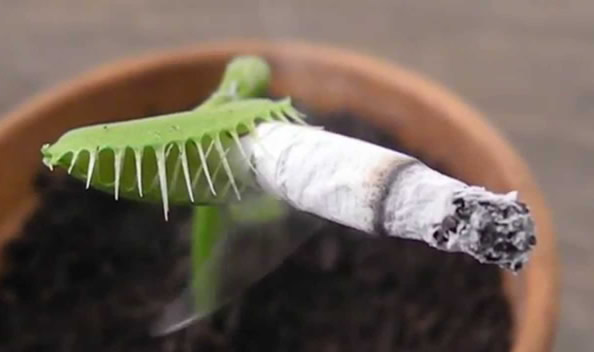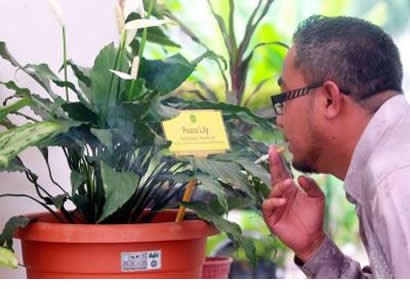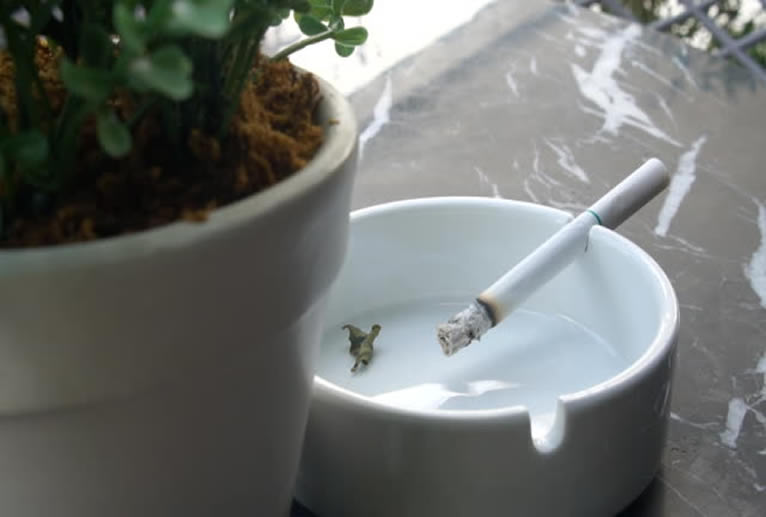As an ex-smoker, being roughly 15 years smoke-free, I don’t have to worry about my plants being affected by second-hand cigarette smoke. However, many of the readers of this website are concerned about the effects cigarette smoke can have on their indoor plants.
So here I address the questions – does smoke kill plants … can cigarette smoke kill houseplants or is it perfectly safe?
Table of Contents
- The Effect Of Cigarette Smoke On Houseplants
- The positive effect houseplants have on cigarette smoke
- Scientific studies find indoor plants filter cigarette smoke very effectively
- Vegetables also filter toxins from cigarette smoke but this is not a good thing
- 12 indoor plants that filter cigarette smoke and clean the air
- Cigarette ash is not good for plants
The Effect Of Cigarette Smoke On Houseplants
Scientific studies have demonstrated that cigarette smoke has no adverse effect on houseplants.
In fact, most houseplants will filter cigarette smoke and actually clean the air of the toxins contained in all tobacco smoke.
It is not advised to smoke around vegetables however as they store the filtered toxins.
You will then ingest those toxins when you consume the vegetables.
Basically, cigarette smoke is not bad for plants but plants are great for filtering cigarette smoke from your home.
The positive effect houseplants have on cigarette smoke
Although there is some circumstantial and anecdotal evidence to suggest that some plants hate coming in contact with the nicotine from cigarettes, plants suffer no damage from cigarette smoke.
In fact, most houseplants work exceptionally well as natural air purifiers.

So, rather than harming your indoor plants, the toxins in cigarette smoke are actually filtered out of the air by them.
There are several studies that have been conducted to research the ability of plants to filter cigarette smoke and other forms of tobacco smoke from the environment.
These studies have greatly increased our understanding of how plants deal with toxins in their immediate environment.
Scientific studies find indoor plants filter cigarette smoke very effectively
One study into the effectiveness of houseplants to filter toxins from cigarette smoke, completed at the Department of Environmental Science, Konkuk University, in Seoul, South Korea, was very interesting.
The results from this study clearly demonstrated that indoor plants are able to effectively filter harmful toxins from the air that are directly related to tobacco smoke.
The researchers found that, although there was some variations in the filtering of tobacco smoke between different plant species, indoor plants can effectively filter tobacco smoke in both light and dark conditions.
Another study conducted by NASA in 1989 also found that indoor plants can effectively clean pollutants from the air.
NASA scientists tested how common houseplants, placed in sealed chambers, could deal with certain airborne toxins.
Within these sealed chambers the plants were subjected to some nasty carcinogens (chemical agents that can cause cancer) which included benzene and trichloroethylene.
The researchers found that indoor plants easily and naturally filtered the harmful chemical substances from the air. Some of the plants tested showed an ability to remove up to 90% of the chemicals within only a 24 hour period.
According to the Journal of Exposure Science & Environmental Epidemiology volume Americans, on average, spend 90% of their time indoors.
So these results should be interesting to any smokers.
The results of the NASA study were so interesting and so potentially significant for the health of Americans that a follow-up study was conducted by Wolverton Environmental Services, in Mississippi.
In this study researchers added ammonia, formaldehyde and xylene to mix to mimic the harmful byproducts of cigarette smoke.
The study resulted in some startling discoveries.
The Wolverton study found that each indoor plant was able to remove significant amounts of ammonia, formaldehyde and xylene from the air.

Not only did the plants themselves filter the harmful toxins from the air bit it was discovered that even the microorganisms in the soil helped to filter out the toxins.
Once removed the toxins are then stored in the roots and cells of the plant, basically isolating them from the surrounding environment.
So as you can see, houseplants are not only safe from the harmful effects of cigarette smoke but they can keep the people around them safe from it as well.
Vegetables also filter toxins from cigarette smoke but this is not a good thing
It should be noted that just like other houseplants, or garden plants, vegetables will also filter the toxins from cigarette smoke.
But unlike the positive filtering effects that houseplants give to us, using vegetables to clean the air is not a good idea!
Just like other houseplants, and garden plants, vegetable plants will purify toxins from the air.
But this is not a good thing.
Why is it so bad if your vegetables filter toxins from the air?
Smoking around vegetable plants leads to toxic veg
Well, as we seen in the Wolverton study mentioned above, the toxins that are filtered from the air are stored within the plant itself.
Not only do the roots isolate and store these toxins but they also pass them into the very cells of the plant.
This may be good for cleaning the air but it is not so good when it comes time to consume the harvest of the plant – as is the case with vegetables.
The harmful cigarette toxins, like ammonia and formaldehyde, may well be stripped from the air by the vegetable plant, meaning you will not have to inhale them, but they have to go somewhere.
That somewhere is the cells of the vegetables that you intend to eat.
So smoking around vegetable plants is really not such a good idea.
The negative effect of nicotine absorption by vegetables
There is also strong evidence to support the view that plants are susceptible to absorbing nicotine from their environment – the main factor in cigarette and tobacco products that makes them so addictive.
It seems that when a plant absorbs nicotine it has no measurable, nor detrimental, effect on the plant.
So why is nicotine absorption a problem for vegetables then?
Well, it’s a problem when you eat the vegetables that contain elevated amounts of nicotine.
Although there are some plants that naturally have small amounts of nicotine in them, such as tomatoes for example, they have only small trace amounts and not enough to negatively affect anyone who consumes them.

Eggplants have much higher levels of nicotine.
Just 10 grams of raw eggplant contains the same amount of nicotine that you would ingest when exposed to 3 hours in a cigarette-smoke-filled room.
Luckily of course we rarely don’t eat eggplant raw but this example illustrates just how easy it is to consume vegetables with high nicotine levels.
Other vegetables grown around constant cigarette smoke would have a similar, or worse, effect.
So what’s the problem with ingesting too much nicotine? I mean, nicotine is the least harmful substance in tobacco. Right?!
Well, exposure to elevated amounts of nicotine, although not cancer-causing nor harmful in the long-term, can have some immediate detrimental effects on mind and body.
As well as the usual dizziness, nausea and disrupted sleep that elevated amounts of nicotine can cause, there can also be a surge of adrenaline and a release of glucose into the bloodstream.
The high nicotine levels then inhibit the pancreas from producing sufficient insulin.
This can be accompanied by an increase in heart rate, heavier breathing and higher blood pressure.
So, it’s clear to see that subjecting homegrown vegetables to regular cigarette smoke is a pretty bad idea.
But, it isn’t just smoking around the plant that can cause it to absorb nicotine.
Nicotine can also be passed on to plants and vegetables via touch.
Because your fingers will be laced with traces of nicotine, and other harmful chemicals, after smoking a cigarette or other tobacco product, the plant will be exposed to those chemicals when you touch it as will the soil it is growing in.
So, even if you do not smoke around your plants you could still negatively affect them, unwittingly and inadvertently, if you don’t wash your hands after you smoke a tobacco product.
12 indoor plants that filter cigarette smoke and clean the air
Below is a list of all the indoor plants that filter cigarette smoke and that were used in a NASA study. These plants were found to effectively filter toxins from the air.
12 indoor plants that filter cigarette smoke and other toxins from the air according to a NASA study:
- Bamboo palm.
- Chinese evergreen.
- English ivy.
- Ficus.
- Gerbera daisy.
- Janet Craig.
- Marginata.
- Mass cane/Corn cane.
- Mother-in-law’s tongue/Snake Plant.
- Peace lily.
- Pot mum.
- Warneckei.
The Wolverton study, mentioned above, found that the plants lady palm (Rhapis excelsa) and Boston Fern (Nephrolepis exaltata) were tremendously successful in removing formaldehyde from the environment (one of the most dangerous chemicals in cigarette smoke).
Even better though, it was discovered that these two houseplants actually improved at the filtering process over time as the microorganisms in the soil adapted and became more adept at the filtering process.
You can find these plants, available for home delivery, at both Home Depot and Amazon.
Cigarette ash is not good for plants
There is an argument for using cigarette ashes on houseplants and outdoor plants but, in truth, it is a weak one.
Cigarette ashes are not good for houseplants or outdoor plants.
Although cigarette ash can contain traces of nicotine that will act as an insecticide, protecting your plant from pests, there are many harmful substances in it that will hurt the plant rather than help it.
Cigarettes by their very nature are harmful.
Not only do they contain addictive nicotine but they also contain harmful substances that are lethal in large quantities, and just as lethal in small quantities over a regularly and sustained period.
Why would you want to give the byproduct of such a harmful thing to your plants?
You are much better using recommended plant food.
Avoid things like cigarette ashes and the equally popular, but just as bad, coffee grounds (see this article and this article) and stick to proper and proven houseplant food.

